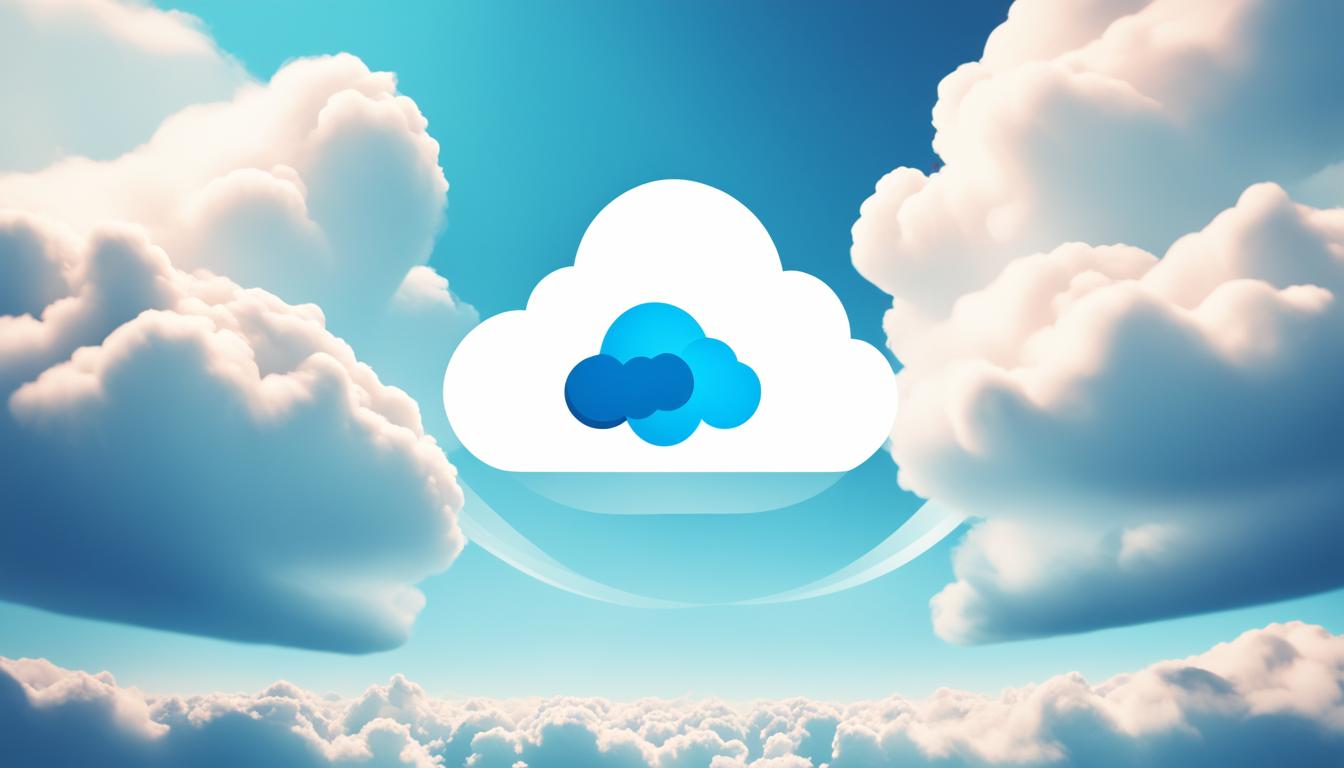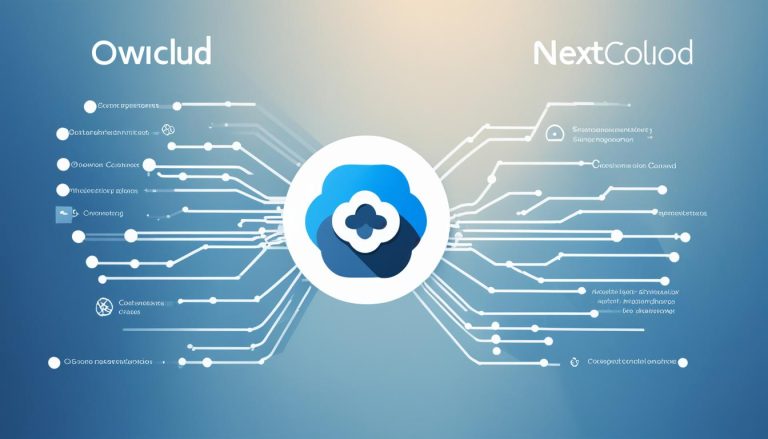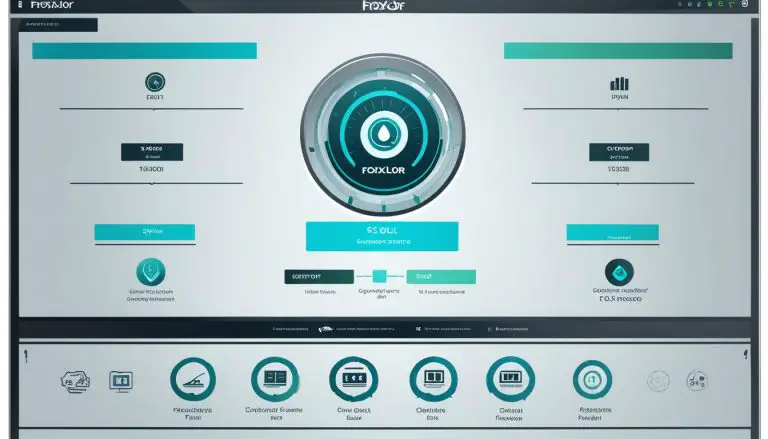Nextcloud vs Dropbox: My Cloud Storage Face-Off
Welcome to my comprehensive comparison of Nextcloud and Dropbox, two leading cloud storage solutions. As we delve into the features, security measures, and collaboration tools offered by these platforms, you’ll gain valuable insights to help you make an informed choice for your cloud storage needs.
Key Takeaways:
- Nextcloud and Dropbox are popular cloud storage services that offer file syncing and sharing capabilities.
- Both platforms prioritize security and provide features such as data encryption and two-factor authentication.
- Nextcloud shines with its vibrant app ecosystem and user-friendly interface.
- While Nextcloud focuses on self-hosting and customization options, Dropbox offers commercial support and pricing plans.
- Both platforms are compatible across devices and integrate well with other tools and services.
The History of ownCloud and Nextcloud
ownCloud and Nextcloud are two prominent cloud storage platforms that have revolutionized the way we manage and access our files. In this section, we will delve into the fascinating history of these two platforms and explore how they have evolved to become key players in the cloud storage market.
ownCloud:
In 2010, Frank Karlitschek, a passionate advocate for open-source software, created ownCloud as an alternative to proprietary cloud storage services like Dropbox and Google Drive. With a strong emphasis on data privacy and security, ownCloud quickly gained popularity among businesses and individuals looking for more control over their sensitive information.
By empowering users to host their own cloud storage servers, ownCloud offered a level of customization and freedom that was previously unavailable in mainstream cloud storage solutions. Its open-source nature attracted a vibrant community of developers and enthusiasts who contributed to its continuous improvement and expansion of features.
In 2016, the ownCloud story took an intriguing turn when a group of core developers, led by Frank Karlitschek, forked the ownCloud project and formed Nextcloud. This momentous decision was driven by a desire for greater transparency, collaborative development, and community engagement.
Nextcloud is built upon the solid foundation of ownCloud, but with a renewed focus on user-centric innovation and open-source principles. The platform continued to prioritize data security and privacy, offering features like end-to-end encryption and robust access controls. Additionally, Nextcloud placed a strong emphasis on fostering a thriving ecosystem of third-party apps that further expanded its functionality and versatility.
Both ownCloud and Nextcloud have come a long way since their inception. Today, they are recognized as leading players in the cloud storage industry, empowering users around the world to store, sync, and share their files securely and seamlessly.
Nextcloud vs ownCloud: Similarities
When comparing Nextcloud and ownCloud, it becomes apparent that these two cloud storage platforms have several similarities in terms of file syncing and sharing, security features, and collaboration tools.
First and foremost, both Nextcloud and ownCloud offer powerful file syncing and sharing capabilities. Users can effortlessly access and share their files across various devices, thanks to the availability of desktop and mobile clients offered by both platforms.
In addition to file syncing and sharing, both Nextcloud and ownCloud prioritize security. They offer robust security features such as data encryption, two-factor authentication, and granular access controls. These measures ensure that users’ data remains secure and protected from unauthorized access.
Furthermore, both platforms provide collaboration tools that enhance productivity and teamwork. Features like document editing and shared calendars enable users to work collaboratively on projects, schedule events, and stay organized.
“Both Nextcloud and ownCloud provide powerful file syncing and sharing capabilities. They offer desktop and mobile clients for seamless access to files across devices. Both platforms prioritize security and offer features like data encryption, two-factor authentication, and granular access controls. Additionally, they provide collaborative tools such as document editing and shared calendars.”
Overall, Nextcloud and ownCloud share several similarities when it comes to file syncing and sharing, security features, and collaboration tools. These similarities make them both attractive choices for individuals and businesses seeking secure and collaborative cloud storage solutions.
Differences in Licensing and Pricing
When it comes to cloud storage solutions, licensing and pricing play a crucial role in determining the best option for your needs. In this section, I will explore the differences in licensing and pricing between Nextcloud and ownCloud, two popular open-source platforms.
Licensing
Nextcloud: Nextcloud embraces the open-source philosophy, allowing users to have complete control over their cloud storage infrastructure. With Nextcloud, you have the freedom to choose your own infrastructure or servers, making it a suitable choice for those who prefer self-hosting their data. This licensing model ensures that you can customize and tailor the platform to meet your specific requirements.
ownCloud: While ownCloud is also an open-source solution, it offers more commercial-focused support and services. They provide a range of licensing options to cater to different needs, including self-hosting or opting for a commercial plan. The availability of commercial support makes ownCloud a great choice for enterprise users who require professional assistance and dedicated services.
Pricing Models
Nextcloud: Nextcloud is primarily focused on self-hosted cloud storage. As an open-source solution, Nextcloud offers a more cost-effective option compared to proprietary cloud storage services. The pricing for Nextcloud revolves around setting up and managing your own infrastructure, which can vary depending on your specific requirements. This self-hosting approach gives you control over your costs, making it an attractive option for budget-conscious individuals and organizations.
ownCloud: In contrast, ownCloud provides a range of pricing plans tailored to different needs and budgets. These pricing plans come with varying levels of support and additional features. For users who prefer a more streamlined experience and robust customer support, ownCloud’s commercial plans offer peace of mind and tailored assistance.
To summarize, the licensing and pricing models of Nextcloud and ownCloud differ significantly. Nextcloud prioritizes self-hosted cloud storage, offering more flexibility and customization options. On the other hand, ownCloud provides a range of pricing plans, including commercial support and services, appealing to users who value professional assistance and specific features.
Continue reading to explore the ecosystem, user interface, security features, and more in the upcoming sections of this article.
The Ecosystem and User Interface
Nextcloud offers users a vibrant ecosystem with its diverse range of over 200 apps available in the Nextcloud app store. These apps provide additional functionalities, enhancing the overall user experience of the platform. From groupware and productivity tools to security features, Nextcloud’s app store offers a wide array of options to suit every user’s needs and preferences.
Interface design and user experience are paramount in Nextcloud’s development. The platform has made significant strides in creating an intuitive and user-friendly interface, ensuring that users can navigate through the various features and functionalities with ease. Nextcloud’s commitment to interface design enables users to seamlessly manage their files and collaborate effectively, enhancing overall productivity.
Seamless Integration and Customization
One of the standout features of Nextcloud’s app store is its seamless integration capabilities with third-party apps and services. Nextcloud enables users to connect popular email clients, video call tools, and password managers, among others, effortlessly enhancing their workflow and productivity.
In addition to integration capabilities, Nextcloud provides extensive customization options, allowing users to tailor their cloud storage experience to their specific needs. Whether it’s designing personalized dashboards or customizing security settings, Nextcloud offers the flexibility to create a cloud storage solution unique to each user.
- Integrate popular email clients, video call tools, and password managers
- Customize security settings and personalize dashboards
- Enhance workflow and productivity
Nextcloud’s commitment to seamless integration and customization empowers users to optimize their cloud storage experience, making it a versatile and adaptable platform for individuals and businesses.
Security and Privacy Features
When it comes to the security and privacy features of cloud storage platforms, both Nextcloud and ownCloud take data protection seriously. They offer essential features such as data encryption, two-factor authentication, and ransomware protection to safeguard your valuable information.
However, Nextcloud stands out with its industry-leading security practices and commitment to transparency. In fact, Nextcloud actively encourages security researchers to participate in their bug bounty program, offering high open-source security bug bounties. This proactive approach ensures that any vulnerabilities in the platform can be identified and resolved promptly, enhancing the overall security of Nextcloud.
To provide users with complete control over their privacy, Nextcloud also offers a privacy center. This center allows users to have full visibility and control over their data, including who has access to it. This level of privacy control empowers users to make informed decisions regarding the sharing and storage of their sensitive information.
“At Nextcloud, we prioritize the security and privacy of our users. We actively engage with the security research community through our bug bounty program, as we believe in the power of collaboration to strengthen our platform’s security measures.” – CEO of Nextcloud
Installation and Customizability
Setting up and customizing your cloud storage server is a crucial aspect of the self-hosted experience. Nextcloud offers a user-friendly installation process, making it easy for users to set up their own server. The platform provides helpful tips and recommendations to guide you through the installation process smoothly. Additionally, Nextcloud offers snap and VM images, which simplify server management and maintenance.
On the other hand, ownCloud also provides similar installation options, allowing users to set up their server according to their requirements. However, compared to Nextcloud, ownCloud has placed more emphasis on providing commercial support and services for enterprise users.
Both Nextcloud and ownCloud offer extensive customization options, enabling users to tailor their cloud storage experience to their specific needs. From choosing themes and layouts to configuring storage options, users have the flexibility to create a personalized environment.
Whether you choose Nextcloud or ownCloud, you can enjoy the benefits of self-hosted cloud storage with easy installation, customization options, and control over your data.
Key Points:
- Nextcloud provides a user-friendly installation process with helpful tips and recommendations.
- OwnCloud also offers similar installation options and focuses on commercial support for enterprise users.
- Both platforms offer extensive customization options, allowing users to personalize their cloud storage experience.
Integration with Other Tools and Services
Nextcloud and ownCloud both excel in their integration capabilities, allowing users to connect with a wide range of third-party apps and services. These cloud storage platforms offer seamless compatibility with popular email clients, video call tools, password managers, and more, enhancing the overall functionality and productivity of the user experience.
Integration with Email Clients
Whether you rely on Microsoft Outlook, Gmail, or other email clients, both Nextcloud and ownCloud provide easy integration, ensuring smooth communication and collaboration. With just a few clicks, you can sync your emails, contacts, and calendars, allowing for efficient organization and efficient workflow.
Collaboration with Video Call Tools
Video conferencing has become a crucial part of remote work and team collaborations. Nextcloud and ownCloud offer integrations with popular video call tools such as Zoom, Microsoft Teams, and Google Meet, enabling seamless online meetings and real-time communication.
“The ability to integrate with various video call tools adds tremendous value to both Nextcloud and ownCloud, as it eliminates the need for switching between platforms and ensures a smooth collaboration experience.” – John Johnson, Collaboration Expert
Integration with Password Managers
Managing multiple passwords can be challenging, but Nextcloud and ownCloud simplify the process by integrating with password managers like LastPass and KeePass. This integration allows for secure and convenient access to your passwords across devices, ensuring your sensitive information is protected.
Cross-Platform Compatibility
Both Nextcloud and ownCloud offer cross-platform compatibility, supporting a wide range of operating systems to facilitate seamless access to your files and data. Whether you use Windows, macOS, Linux, Android, or iOS, you can enjoy consistent cloud storage capabilities regardless of the device or platform you choose.
To illustrate the seamless integration and cross-platform compatibility of Nextcloud and ownCloud, take a look at the image below:
- Nextcloud and ownCloud integrate with a variety of third-party apps and services, enhancing productivity and workflow.
- Email clients, video call tools, and password managers can be easily integrated, providing a seamless user experience.
- Both platforms are cross-platform compatible, supporting Windows, macOS, Linux, Android, and iOS.
Mobile and Desktop Clients
In today’s digital age, having seamless access to your files across devices is essential. Both Nextcloud and ownCloud understand this need and provide free mobile and desktop clients for Android, iOS, and various desktop operating systems. These clients offer a range of features that enhance the file management experience.
With file synchronization, you can ensure that the latest version of your files is available on all your devices. Any changes made on one device are automatically reflected on others, allowing for effortless collaboration and access to up-to-date information.
Automatic upload of photos and videos is another convenient feature offered by these clients. As soon as you capture a photo or record a video on your mobile device, it will be automatically uploaded to your cloud storage, eliminating the hassle of manually transferring files.
Real-time notifications for new events keep you informed about any changes or activities related to your files, such as shared file updates, comments, or mentions. This feature ensures that you stay updated and can respond promptly to any file-related interactions.
Nextcloud Collectives and Collaboration
When it comes to collaboration features, Nextcloud truly excels. With its innovative Collectives feature, users can seamlessly collaborate and organize tasks and coordination. Whether you’re part of a small team or a large organization, Nextcloud’s collaboration tools will empower you to work together efficiently and effectively.
The Power of Collectives
Nextcloud’s Collectives feature provides a centralized space where team members can come together, share ideas, and collaborate on projects. It allows for easy communication and coordination, ensuring everyone stays on the same page.
With Collectives, you can create tasks, assign them to team members, and track their progress. This intuitive tool streamlines project management and enables seamless collaboration.
Groupware Apps for Enhanced Collaboration
In addition to Collectives, Nextcloud offers a wide range of groupware apps that further enhance collaboration. These apps provide specialized functionalities and tools tailored to specific team needs.
For example, Nextcloud’s groupware apps include shared calendars, allowing teams to schedule meetings, track deadlines, and manage events all in one place. This eliminates scheduling conflicts and ensures everyone is on the same page.
Nextcloud also offers groupware apps for instant messaging and video conferencing, enabling real-time communication and collaboration, even when team members are geographically dispersed.
Effortless Document Editing
Collaborating on documents has never been easier with Nextcloud. The platform provides robust document editing capabilities that allow multiple users to work on the same document simultaneously.
Whether you’re co-authoring a report, conducting a brainstorming session, or seeking feedback on a proposal, Nextcloud’s document editing feature enables seamless collaboration, eliminating the need for multiple versions of the same document and reducing confusion.
Nextcloud’s document editing capabilities support a wide range of file formats, ensuring compatibility and flexibility for all your collaborative endeavors.
An Image Illustrating Collaboration
Now let’s take a moment to visualize the power of collaboration. Below is an image that represents the seamless collaboration and coordination offered by Nextcloud:

Wrap Up
Nextcloud’s Collectives, along with its groupware apps and document editing features, make it an excellent choice for teams and individuals who value collaboration and teamwork. By providing a comprehensive suite of collaboration tools, Nextcloud empowers users to work together efficiently and effectively, ultimately boosting productivity and achieving remarkable results.
Nextcloud Office and Other Productivity Tools
Nextcloud Office is an innovative online office suite based on LibreOffice, allowing for seamless real-time collaborative document editing. With its integration of LibreOffice, Nextcloud Office supports a wide range of file formats, ensuring compatibility and flexibility for users.
Nextcloud Office goes beyond traditional document editing capabilities by offering a variety of productivity tools. One notable feature is its robust task management system, which enables users to create, assign, and track tasks directly within the platform. This streamlines workflow and enhances team collaboration, making it easier to stay organized and meet project deadlines.
In addition to task management, another valuable productivity tool available in Nextcloud Office is note-taking. Users can create and organize notes, making it convenient for capturing ideas, jotting down meeting minutes, or keeping track of important information. The interface is intuitive and user-friendly, providing a seamless note-taking experience.
As a comprehensive cloud storage solution, Nextcloud with its Office suite bridges the gap between file management and productivity. By integrating document editing, task management, and note-taking into one platform, Nextcloud simplifies workflows and enhances productivity for individuals and teams alike.
Nextcloud Office seamlessly combines document editing, task management, and note-taking, providing a holistic productivity experience for users.
LibreOffice Integration for Seamless Document Editing
Thanks to the integration with LibreOffice, Nextcloud Office offers a powerful document editing experience. Users can collaborate on documents in real-time, making changes and updates that are instantly reflected for all collaborators. Whether it’s a Word document, an Excel spreadsheet, or a PowerPoint presentation, Nextcloud Office supports a wide range of file formats, ensuring smooth editing and compatibility.
Nextcloud Office’s LibreOffice integration allows for real-time collaborative document editing across various file formats, empowering users to work together efficiently.
Enhanced Task Management and Note-Taking
Nextcloud Office takes productivity to the next level with its integrated task management and note-taking features. The task management system enables users to create tasks, assign them to team members, set due dates, and track progress. This ensures clear communication and accountability, improving team collaboration and project management.
Meanwhile, the built-in note-taking functionality simplifies the process of capturing and organizing important information. Users can create, edit, and manage notes within Nextcloud Office, providing a centralized location for all essential notes and ideas.
- Easily create, assign, and track tasks
- Stay organized and meet project deadlines
- Effortlessly capture and manage notes
With these productivity tools at your disposal, Nextcloud Office empowers individuals and teams to work efficiently and cohesively.
Conclusion
When it comes to cloud storage solutions, both Nextcloud and Dropbox offer powerful features for file syncing and sharing, security, and collaboration tools. However, Nextcloud emerges as the best choice for users who prioritize open-source community, strong security and privacy measures, extensive customization options, and a vibrant ecosystem of third-party apps.
Nextcloud’s open-source nature allows for greater transparency and community-driven development, giving users more control over their data. With its focus on security, Nextcloud offers features like data encryption, two-factor authentication, and bug bounties, ensuring that your files remain safe and protected. The platform also provides a privacy center, empowering users to have full control over their data and who can access it.
Another advantage of Nextcloud is its high level of customization. Whether you want to self-host your cloud storage or choose your own infrastructure, Nextcloud offers a user-friendly setup process and a range of options to tailor your experience. The platform also boasts an extensive app store, providing additional functionalities and enhancing productivity for users.
While Dropbox is a well-known and widely-used cloud storage solution, Nextcloud offers a more comprehensive and flexible cloud storage experience, making it the best choice for users seeking a robust and customizable solution with strong security and privacy features. Ultimately, the decision between Nextcloud and Dropbox depends on your specific needs and preferences, but Nextcloud stands out as the top contender in the cloud storage market.
FAQ
What is the difference between Nextcloud and Dropbox?
Nextcloud and Dropbox are both cloud storage solutions, but they have different features, security measures, and pricing models. Nextcloud focuses on self-hosting and offers more customization options, while Dropbox is a commercial service with a simpler setup process.
Is Nextcloud or Dropbox better for file syncing and sharing?
Both Nextcloud and Dropbox offer powerful file syncing and sharing capabilities. However, Nextcloud provides more control over your data and allows you to choose your own infrastructure or servers, while Dropbox offers a seamless and user-friendly experience.
How secure are Nextcloud and Dropbox?
Both Nextcloud and Dropbox prioritize security and offer features like data encryption, two-factor authentication, and granular access controls. However, Nextcloud has industry-leading security practices and offers higher bug bounties for open-source security vulnerabilities.
Can I integrate Nextcloud or Dropbox with other apps and services?
Yes, both Nextcloud and Dropbox offer integration with a wide range of apps and services, including popular email clients, video call tools, and password managers. They are also cross-platform, supporting Windows, macOS, Linux, Android, and iOS.
Do Nextcloud and Dropbox have mobile and desktop clients?
Yes, both Nextcloud and Dropbox provide free clients for Android, iOS, and desktop systems. These clients offer file synchronization, automatic upload of photos and videos, and real-time notifications for new events.
Is Nextcloud or Dropbox better for collaboration?
Nextcloud offers features like Collectives, collaborative document editing, groupware apps, and shared calendars, making it a powerful choice for teams and individuals who need to work together. Dropbox also provides collaboration tools, but Nextcloud has a broader range of options.
Does Nextcloud have an online office suite?
Yes, Nextcloud offers Nextcloud Office, which is a LibreOffice-based online office suite. It allows for real-time collaborative document editing, supports multiple file formats, and provides additional productivity tools like task management and note-taking.
Which is the best choice, Nextcloud or Dropbox?
The choice between Nextcloud and Dropbox depends on your specific needs and preferences. Nextcloud offers more control, customization, and security features, making it an excellent choice for individuals and businesses who value these aspects. Dropbox, on the other hand, provides a user-friendly experience and integrations with various apps and services.
- About the Author
- Latest Posts
Janina is a technical editor at Text-Center.com and loves to write about computer technology and latest trends in information technology. She also works for Biteno.com.






